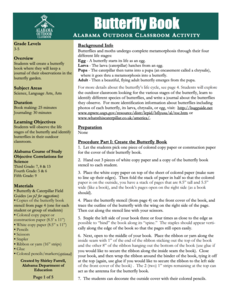Curated OER
Butterfly Snack Shack
Students research butterflies and their life cycle, record facts about butterflies such as what they eat, where they rest, and how long they live, gather information about how to attract butterflies to their yards and gardens, and create...
Curated OER
Leaf-Motif Frame
Students research leaves and their life cycle as well as their importance to the environment. After discussing photosynthesis, habitats, and nutrients for the soil, students collect and identify fallen leaves. Students use their...
Curated OER
The Long Road to Coffee
Students discover how coffee is processed from a plant, to a drink. In this life cycle lesson, students study that cells and organisms go through a cycle of growth and change. Students organize picture cards, illustrate how coffee...
NASA
Introduction to Astronomy
Welcome to your new job as an astrophysicist, astrobiologist, engineer, or research scientist at NASA. Your job is to search for alien life in our solar system! Throughout a unit of activities, learners search the galaxy through...
National Wildlife Federation
Call of the Wild: Grades K-4
The sound a frog makes lets people know what it's up to. A two-part lesson begins by discussing the life cycle of a frog and the individual stages with drawings. The second part has learners listen to the frogs' different sounds and what...
Alabama Wildlife Federation
Butterfly Book
Journaling is a great tool for processing information. Budding scientists build their own butterfly journals from their observations in a butterfly garden. The lesson challenges them to identify different stages of the life of the...
National Park Service
Glaciers and Water
Explore the amazing power of glaciers with a hands-on earth science experiment! After first learning basic background information, learners go on to create their very own chunks of frozen water and gravel in order to...
National Wildlife Federation
What's Your Habitat?
How are third graders like rabbits? They both live in habitats and require food, water, and shelter to survive! An educational science lesson encourages your learners to think about their own habitats and survival needs, before comparing...
Lane Community College
Review Sheets: Introductory Physical Science
This hybrid worksheet connects mathematics to a science class. Learners practice solving problems that involve making a variety of conversions. An assortment of questions hits all the calculations needed for a middle school or beginning...
Carnegie Mellon University
Consumer Preferences in Lighting
What is a watt? This tongue-twisting, mind-bending question and others are answered through this lesson on the different lighting options available. With the support of a PowerPoint, teach your physical science class about units of...
Society of Petroleum Engineers
Renewable and Nonrenewable Energy
Energize an environmental science unit on natural resources with this collection of instructional materials. From simple coloring sheets for primary grade children, to guiding questions for a high school research...
Wildwood Trust
Habitats
The circle of life is all around us, from the black bears in the nearby mountains to the pile of dead leaves in the backyard. Encourage young scientists to take a critical look at the world around them with a set of lessons...
Institute of Electrical and Electronics Engineers
Waterproof that Roof!
Stop the raindrops from getting into the house! Eager engineers learn about roofing history and waterproofing by nanotechnology. They get into groups and work on designing a waterproof roof for a small model house. The accompanying...
The Science Spot
Flower Basics
Learn about plants and pollination with a worksheet about the parts of a flower. After labeling the anatomy of a flower using a word bank, kids explain the difference between self-pollination and cross-pollination, and unscramble...
Space Awareness
The Sun Compass of the Vikings
Evidence shows the Vikings likely navigated by using a simple sundial to find their course. Videos, a short story, and discussion help bring this time period to life as they study European history with a hands-on experiment. Scholars...
Kenan Fellows
What Element Would You Be?
Primo Levi wrote a collection of short stories comparing his life from Italy to Auschwitz to elements in the periodic table. Pupils read an excerpt from his book and research the characteristics of various elements. Then, they make a...
Curated OER
Plant Diversity
Here is an all-encompassing overview of the plant kingdom! In this worksheet, beginning botanists describe characteristics of the four different plant phyla, explain various life cycles, differentiate between monocots and dicots, and...
New South Wales Department of Education
Is it Alive?
Interestingly enough, movement is not a characteristic of living things. The first activity in a series of 20 introduces learners to the concepts of living versus non-living things and then focuses on biologists and what they study....
American Museum of Natural History
Ocean Creature Feature
From coloring to hard protective shells, ocean creatures have adaptation features that help them survive. An eight-question online quiz highlights different ocean animals and their unique characteristics. The resource then offers pop-up...
Exploratorium
Life Size - Explore the Size and Scale of Microscopic Biology
Compare sizes of microscopic items. Given a set of labels of microscopic objects, pupils try to place them in order from smallest to largest. Scholars then compare their lists to the actual comparisons along with the measurements of the...
National Wildlife Federation
Links in the Chain of Life
A small little ant can have a large impact on its ecosystem. Young researchers explore the different species that live in a plains ecosystem. They find the characteristics of several species and then compare species to determine how...
K20 LEARN
It's Alive! Or, Is It?
Seems like a fairly simple question—until you begin asking your class! Get pupils acquainted with the characteristics of life through pairs classification, discussion, and scientific reading. The lesson plan, part of the K20 series, also...
Alabama Wildlife Federation
Butterflies without Borders
Some living things go to extreme measures to avoid the cold. A three-part activity guides learners through the migration of the monarch butterfly. After studying the life cycle of the monarch butterfly, pupils learn the process of...
Aquarium of the Pacific
Kelp Forest Habitat
What forest is in the ocean? The class watches a video that introduces the kelp forest and the parts of kelp. Learners dive into the ocean and see what different species live near the canopy, the midwater, and the bottom of the kelp...
Other popular searches
- 4th Grade Life Science
- Life Science Inquiry
- Life Science Vertebrates
- Life Science Experiments
- K 2 Life Science
- Life Science on Cells
- Life Science Lesson Plans
- Grade 4 Life Science
- Life Science Report Topic
- Australia Life Science
- The Life Science
- Life Science Lessons























